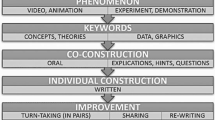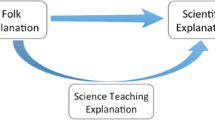Abstract
Science education needs to develop skills such as constructing explanations of natural phenomena with scientific support. This ability allows going beyond the description and explanation of daily life through the usage of scientific knowledge. In this study we implemented fading scaffolds in cycles of inquiry primary science, in two groups of 5th grade students in a learning unit about microorganisms and their proliferation. They wrote several explanations aided by scaffolding material. The trajectory of some students identified relationships between the outcomes of their explanations and the type of scaffold applied. The results showed a learning progression, however not linear. We concluded that scaffolding is useful not only for the design of supportive strategies, but also for students to monitor their own advances and, therefore, the development of metacognitive skills. Projections in the field of didactics of primary science are discussed, as well as considerations for teaching practice and students’ learning.
Access this chapter
Tax calculation will be finalised at checkout
Purchases are for personal use only
Similar content being viewed by others
References
Jorba, J., Gómez, I., Prat, A. (eds.): Hablar y Escribir para Aprender: Uso de la Lengua en Situación de Enseñanza-aprendizaje desde las Áreas Curriculares. Síntesis, Barcelona (2000)
De Longhi, A.L., Ferreyra, A., Peme, C., Bermúdez, G.M., Quse, L., Martínez, S., Iturralde, C., Campaner, G.: La Interacción Comunicativa en Clases de Ciencias Naturales. Un Análisis Didáctico a través de Circuitos Discursivos. Revista Eureka sobre Enseñanza y Divulgación de las Ciencias 9(2), 178–195 (2012)
Berland, L.K., McNeill, K.L.: For whom is argument and explanation a necessary distinction? A response to Osborne and Patterson. Sci. Educ. 96(5), 808–813 (2011)
de Chile, G.: Bases Curriculares 2012 Ciencias Naturales Educación Básica. Ministerio de Educación, Santiago (2012)
NRC: A Framework for K-12 Science Education Practices, Crosscutting Concepts, and Core Ideas. The National Academy Press, Washington, DC (2012)
Lead States: Next Generation Science Standards: For States, By States. Washington, DC: Achieve, Inc. On Behalf of the Twenty-six States and Partners that Collaborated on the NGSS. (2013). http://www.nextgenscience.org/
Ministry of Education, P. R. China.: Middle School Science Curriculum Standard for Compulsory Education. Beijing Normal University Press, Beijing (2011)
OECD: PISA 2015 Results in Focus (2016).https://www.oecd.org/pisa/pisa-2015-results-in-focus.pdf
de Chile, G.: Informe Nacional Resultados PISA 2012. Ministerio de Educación, Santiago (2014)
Arzola, N., Muñoz, T., Rodríguez, G., Camacho, J.: Importancia de los Modelos Explicativos en el Aprendizaje de la Biología. Revista Ciencia Escolar: Enseñanza y Modelización 1, 7–16 (2011)
McNeill, K.L., Lizotte, D.J., Krajcik, J., Marx, R.W.: Supporting students’ construction of scientific explanations by Fading Scaffolds in instructional materials. J. Learn. Sci. 15(2), 153–191 (2006)
Hsu, Y.S., Lai, T.L., Hsu, W.H.: A design model of distributed scaffolding for inquiry-based learning. Res. Sci. Educ. 45, 241–273 (2014)
Ruiz Primo, M.A., Li, M., Tsai, S.P., Schneider, J.: Testing one premise of scientific inquiry in science classrooms: examining students’ scientific explanations and student learning. J. Res. Sci. Teach. 47(5), 583–608 (2010)
Lee, H.S., Songer, N.B.: Expanding an understanding of scaffolding theory using an inquiry-fostering science program (2004). http://www.biokids.umich.edu/papers/56LeeSongerScaffolding.pdf
Abd-El-Khalick, F., Boujaoude, S., Duschl, R., Lederman, N.G., Mamlok-Naaman, R., Mansoor, N., Treagust, D., Tuan, H.L.: Inquiry in science education: international perspectives. Sci. Educ. 88(3), 397–419 (2004)
Zangori, L., Forbes, C.T.: Preservice elementary teachers and explanation construction: knowledge-for-practice and knowledge-in-practice. Sci. Educ. 97(2), 310–330 (2013)
Sanmartí, N.: Hablar, Leer y Escribir para Aprender Ciencia. In: Fernández, P. (ed.) La Competencia en Comunicación Lingüística en las Áreas del Currículo, pp. 103–128. MEC, Madrid (2007)
Lin, T.C., Hsu, Y.S., Lin, S.S., Changlai, M.L.: A review of empirical evidence of scaffolding for science education. Int. J. Sci. Math. Educ. 10(2), 437–455 (2012)
McNeill, K.L., Krajcik, J.: Synergy between teacher practices and curricular scaffolds to support students in using domain-specific and domain-general knowledge in writing arguments to explain phenomena. J. Learn. Sci. 18(3), 416–460 (2009)
Braaten, M., Windschitl, M.: Working toward a stronger conceptualization of scientific explanation for science education. Sci. Educ. 95(4), 639–669 (2011)
Acknowledgments
Funding from CONICYT_PAI, Program for Returning Researchers from Abroad, call 2013 grant number 821320002 and PIA-CONICYT Basal Funds for Centers of Excellence Project FB0003 is gratefully acknowledged.
Author information
Authors and Affiliations
Corresponding author
Editor information
Editors and Affiliations
Rights and permissions
Copyright information
© 2018 Springer International Publishing AG
About this paper
Cite this paper
Sommer Lohrmann, M.E., Cabello, V.M. (2018). Supporting the Construction of Explanations of Natural Phenomena in Primary School Pupils. In: Andre, T. (eds) Advances in Human Factors in Training, Education, and Learning Sciences. AHFE 2017. Advances in Intelligent Systems and Computing, vol 596. Springer, Cham. https://doi.org/10.1007/978-3-319-60018-5_41
Download citation
DOI: https://doi.org/10.1007/978-3-319-60018-5_41
Published:
Publisher Name: Springer, Cham
Print ISBN: 978-3-319-60017-8
Online ISBN: 978-3-319-60018-5
eBook Packages: EngineeringEngineering (R0)




